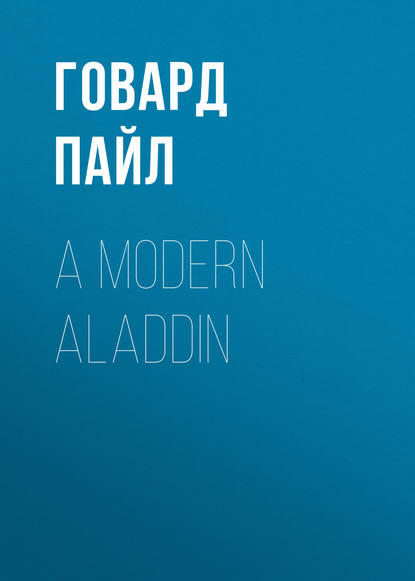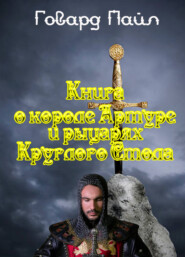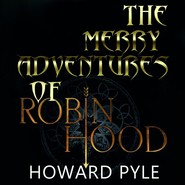По всем вопросам обращайтесь на: info@litportal.ru
(©) 2003-2024.
✖
A Modern Aladdin
Настройки чтения
Размер шрифта
Высота строк
Поля
"Raymond hesitated. Agnes fixed her beautiful eyes upon him. 'Do you not love me, then?' said she.
"Raymond thrust his hand into his bosom, and drew from the pocket of an inner vest the little volume.
"Agnes took it, and look curiously at it. 'Raymond,' said she, 'will you give me this book for my own, to do as I choose with it?'
"Raymond made no answer.
"'You will not? Do you, then, love it more than me?' She stood holding the book, waiting for his reply.
"'I give it to you, Agnes,' said he at last.
"'And it is now mine to do with as I choose?'
"'It is yours.'
"'Give me the lantern.'
"Raymond reached it to her wonderingly. She took it, raised the slide, opened the book, and held the parchment leaves over the flame within. Raymond gave a sharp cry, 'Agnes!' He would have snatched it from her, but she laid her hand upon his arm.
"'Stop!' said she. 'Have you not all that man can desire in this world without this book? You have given it to me; it is mine, and I shall do as I choose with it. You cannot love it with all your heart and me also. Which do you choose?'
"She had held the book to the flames while talking, her eyes fixed intently upon it as the parchment leaves blackened and curled and wrinkled. Raymond groaned and turned away. The oppressive odor of the burning skin filled the air, and when Agnes cast the remains of the volume into the pit beneath the grate of the furnace, the wisdom of the great Geber, the learning that had taken him a lifetime to accumulate, was nothing but a blackened mass of stinking cinders.
"'Come,' said Agnes, 'let us leave this dark and dismal place, and go back yonder into the other room.' She led the way into the first apartment, and there sat down upon the couch, motioning Raymond to a seat beside her. 'Are you happy, Raymond?' said she.
"'Yes,' he whispered. He would have taken her into his arms, but she held up her hand.
"'Wait,' said she. 'Have you, then, all that you desire?'
"'Yes,' he said, in a trembling voice; 'with your love.'
"'Poor Raymond!'
"There was a little space of silence. And then at last she turned to him with that same strange smile upon her face. 'Do you know what my father did when he moved his hands as he did when you saw him?' said she.
"'No,' said Raymond.
"'He drew strange pictures before my eyes, Raymond, and I saw them as plainly as I see you now. Would you like me to tell you what they were?'
"Raymond nodded his head.
"'Then I shall tell you. I saw you and my father in this place together, and you had completed the last of your great experiments, and had sealed those two phials as I saw them yonder. I saw you and my father quit this place filled with joy that the last touch of your work was done. After that came the dark blank of night and of sleep. The next picture he drew was of the morning – of this morning when he died – and I saw him sleeping upon his bed. The door opened, and I saw you come softly in and forward to his bedside, and stand looking down at him as he slept. Above his face you drew strange characters with your finger; they were spells that he himself had taught you. After that I saw you, Raymond, draw a bunch of keys from beneath his pillow. Then I saw you go to the great iron-bound chest that stood in the corner. From within you took a little silver box; you did not open the lid, but I saw that within it was a crystal globe about as large as a dove's egg. I saw you relock the chest and replace the keys beneath my father's pillow.' Agnes was looking into Raymond's face as she spoke, and her lips still wore that same faint smile. 'What next I saw, Raymond, was this,' said she. 'You took from your pouch a little wooden box filled with a bright green powder; then from the same pouch you drew a long slender needle. Upon the point of the needle you took a little of the green powder. (All this my father drew with his dying hand in the air, Raymond.) I saw you stoop over him and thrust that long shining needle deep into his shoulder. Then you turned and left the room; but as you left it, I saw your face as I see it now, and it was as white as ashes, as it is now, and the sweat stood in beads upon your forehead, as it stands there now. What did it mean, Raymond?' Her lips never lost that strange, odd smile.
"'God, I do not know!' cried Raymond, hoarsely.
"'It meant that you murdered my father, Raymond – that you murdered the man who taught you all that you now know – that you murdered the man who in nine months made of you, a raw student, the most learned alchemist, but one, in Europe.'
"There was a long pause of dead silence. 'Agnes,' cried Raymond, in that same hoarse, dry voice, 'Agnes – I love you!'
"The smile never left her lips. 'Very good,' said she; 'but stay, I have not yet done. All that my father had showed me so far was past and gone; now he showed me what was to come. I saw us both pass through that long, dark, narrow way; I saw the dark, vaulted cellar above us; I saw us descend and stand together in the farther room yonder and look upon those phials; I saw myself burning that accursed book by the light of the candle in the lantern; I saw us seated together upon this couch as we are now. What next do you think I saw, Raymond?'
"'I do not know.'
"'I saw this!'
"There was a movement as quick as lightning, a flash, a blow, a deep sigh. Agnes sat for a moment with the smile still resting upon her white lips, and something bright glistening upon her bosom. It was the handle of a dagger, and she had stabbed herself. Then she lay slowly down upon the pillow beside her.
"For one moment Raymond sat as motionless as stone; then he started up with a shrill cry. He leaned over and looked into her face; that smile was still upon her white lips.
"'Agnes!' he cried; then again, 'Agnes!' But the smiling lips never answered; she was dead.
"Raymond slowly turned, and walked heavily and stupidly out of the place, closing the door behind him. At the head of the shaft he mechanically opened the slide of the lantern, and blew out the half-burned candle, and then set the lantern upon the shelf within, as he had been used to do. He closed the trap, and lowered the bar, and snapped the padlock in the staple; then, again, with the same slow, heavy tread, he left the vaulted room, ascended the stone steps, and threaded the passage-way. He did not go back into the master's house, but passed out at the arched gate-way where we, Oliver, entered. Before he went out into the street beyond he laid his hand upon his breast to make sure the silver box containing the talisman was there; it was all that he had saved from his ruin."
IV
"From that time Raymond Lulli led a wandering, irregular, eventful life. Under the spur of his remorse he went first to Rome and then to Tunis, where, until his life was threatened on account of his efforts to convert the Mussulmans, he devoted himself partly to the fulfilment of his original vow, partly to the further study of alchemy. After that he lived for a while in Milan; after that he went to England, where, as I have heard, he transmuted lead and quicksilver into gold to the amount of six millions rose nobles; after that he returned again to Rome; and after that for a second time to Africa, where he took up his abode at Bona.
"Now there was at that time at Bona a famous and learned professor, who had devoted himself more particularly to the study of demonology. It is hardly likely that you have ever heard his name; it was Yusef Ben Djani. I know of nobody since his time who approached him in his knowledge of the science unless, perhaps, it was the great Cornelius Agrippa.
"This learned scholar held that the power of man's will was such that, under certain circumstances, it could be so far impressed upon those diffused forces of life about us as to materialize or concentrate them, and so render them cognizant to the human understanding, or, in other words, visible. Now, Oliver, it is very well known that one man may so impress his will upon another as to render that other will entirely subservient to his own. Under such conditions, the one so impressed sees, feels, smells, tastes, and senses only as the superior will orders; he moves, speaks, and exists as the other commands. If that power, Yusef Ben Djani argued, could impress material men in this world, why could it not impress men in the world immediately beyond? Is not a man, he reasoned, the same man after quitting this world as when he lived in the body? Why, then, is he not as subject to that psychological power there as here, and why, then, could he not be influenced there as well as here? Such an influence Yusef Ben Djani did exert, and succeeded. He materialized those quiescent forces of life, and brought them into such communion with himself that he was able to compel them to that certain exudation of life in quiescence which we in this world call matter. Do you understand me, Oliver?"
Oliver shook his head. "No," said he, "I do not." He had tried to follow the other so far as he was able, but he had long gotten beyond the power of comprehension; the words fell upon his ears one after the other like blows, until his head hummed like a beehive.
The other laughed. "Very well," said he. "It is of no importance that you should comprehend Yusef Ben Djani's theory. But this at least you can understand: he materialized evil spirits.
"Now there was a certain young Venetian student named Nicholas Jovus, who almost from his childhood had possessed a wonderful psychological power upon others. By psychological power I mean the power of superinducing his own will upon the will of another; in other words, to make such another do absolutely as he chose.
"The fame of Yusef Ben Djani was at its height, and Nicholas Jovus, then about four-and-twenty years of age, determined to visit the great master at Bona. The philosopher saw in the young student the material for an even greater than himself. He persuaded him to stay in Bona, and to study the science of demonology under him. It was while there that, with the assistance of his master, Nicholas Jovus superinduced his own will upon the surface of a mirror to such an extent that within it he could at any time see that which he willed to see. It was by means of this mirror that he one time beheld Raymond Lulli, of whom he had often heard, and, circumstances being then peculiarly propitious, beheld at the same time not only Raymond Lulli himself, but the secret of the talisman that he carried in his bosom. And not only did he discover the existence of the talisman, but (Raymond's mind being at that moment concentrated upon the past) he discovered the story of the philosopher's life as I have told it to you, and thus first gained knowledge of those dark chambers below the vault. Yes, Nicholas Jovus saw all this in the mirror just as I have described it to you, Oliver; it was the first and only time, but he never forgot it.
"Now soon after Raymond Lulli had reached Rome, after having left Paris, he was taken with a violent fever, from which he wakened, his physicians told him, only to die. But the physicians were mistaken. The next morning when they visited him he was sitting at the table eating a boiled capon, as well a man as you or I. I need to hardly tell you he had used the talisman of life.
"Yet it was only with great hesitation, and in the last extremity, that Lulli thus rehabilitated himself with a new body, for by so doing he cut himself off forever from all chance of entering those secret chambers again and recovering the phials, which he now bitterly regretted having left behind him in the first throes of his grief and remorse. For Arnold de Villeneuve, for protection against evil powers, had drawn around the door of those underground chambers a circle upon which he had marked a sign that Raymond Lulli could not pass without leaving his newly-acquired body behind him.
"From the time that Raymond Lulli had used the talisman of life to the time that Nicholas Jovus saw him in the mirror, thirty years had elapsed, and yet he appeared as young as upon the day when the Roman physicians had told him that he was to die.
"Nicholas Jovus determined to gain that talisman for his own.
"Now the young Venetian student had a curious, odd servant, very much attached to him, and not so wicked as one might have thought under the circumstances. Early one morning, before the town was awake, Nicholas Jovus, followed by this servant, left the house of his master and hurried down to the sea-shore. He had looked in his glass and saw that Raymond Lulli was walking there. He met the alchemist not far from where a long quay ran out into the water.
"Since the time when he had first seen Raymond Lulli in the glass, Nicholas Jovus had made the acquaintance of the master in his own proper person. Accordingly, Raymond stopped and chatted awhile with the young student. While the two stood talking together that odd servant of whom I spoke stepped around behind the philosopher. He made a silent motion of inquiry, Nicholas Jovus nodded in reply, and the next moment all was over. The serving-man had – had drawn a bag over the philosopher's head.
"Nicholas Jovus thrust his hand into the philosopher's bosom, and, after feeling for a moment, found the talisman, which was enclosed in a bag hung around his neck. He did not take time to unfasten the cord from which it hung, but, giving it a jerk, broke the string with a snap.
"As he did so, Raymond Lulli, who had been lying silent in the encircling arms of that strange servant, gave a sharp, a loud, and a bitter cry.
"What followed was as unlooked-for to Nicholas Jovus as it would have been to you had you been there, Oliver. That quaint servant of his – what think you he did? He laid Raymond Lulli upon the sand of the sea-shore, and stripped the false body off of him as you might strip off a man's coat. The young student did not know how it was done, but done it was, and as deftly and as cunningly as a fisherman might draw the skin from an eel. Then, as Nicholas Jovus stood aghast watching him, he shouldered what appeared to be the empty skin of Raymond Lulli, turned, and running some distance out along the quay, flung his burden with a splash into the water. It sunk like a stone. The Raymond Lulli that was left behind was an old man of seventy-five years of age, bruised, bleeding, dying. My faith, Oliver! It was a long time before Nicholas Jovus could bear the presence of that odd servant of his without a shudder.
"That is all concerning the story of Raymond Lulli and those rooms that you were in not long ago."












